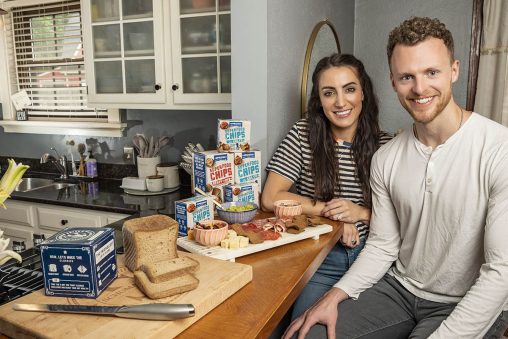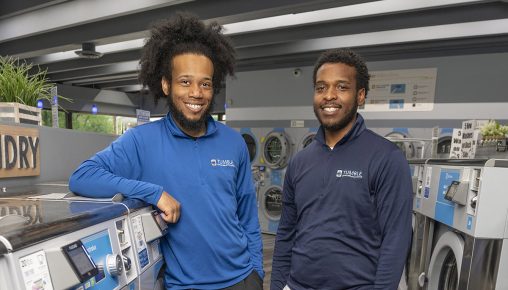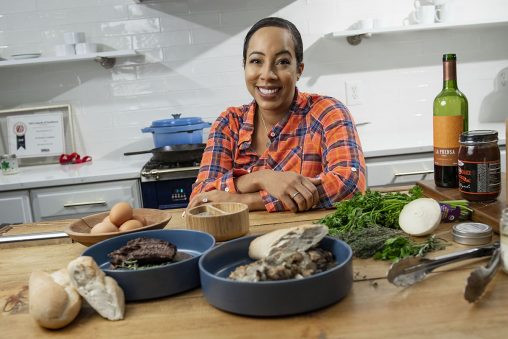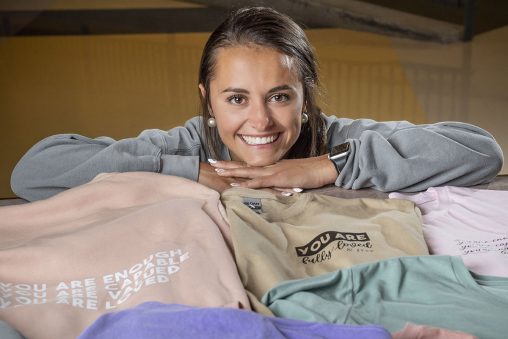By Jim Hannah, Kim Patton, and Kris Sproles
Entrepreneurship has always been at the heart of the Dayton region. From Wright State namesakes Orville and Wilbur Wright—who took the first controlled, powered flight and forever changed the world—to start-up companies launching new products and services every day, the Miami Valley continues to flourish with brilliant minds who possess the grit and determination to make a difference.
When it comes to the next generation of local entrepreneurs, many of these game-changing individuals are getting their start at Wright State. Meet some Raider alumni and students who are making their marks as successful entrepreneurs.

William Schumacher ’11 and his wife Kristen believe the food system is fundamentally broken. They set out to intercept illnesses at the food level.
William Schumacher ’11
For William Schumacher, creating healthy food is not just a business. It’s a mission and a very personal one.
For years, Schumacher watched his father struggle with poor health. As a young child, his father became addicted to fast food and sugary drinks. By the age of 60, his father had developed diabetes and Stage 5 kidney disease and was told he had four weeks to live.
Thanks to intervention at the food level, Schumacher’s father is still here today. Through his company Uprising Food, Schumacher hopes to give his father and many others more moments and memories for years to come.
“We believe the food system is fundamentally broken,” said Schumacher. “We are sick at scale in the most prosperous country in the world. We spend over $3 trillion in health care to treat things that could be intercepted very effectively at the food level.”
In September 2018, Schumacher and his wife Kristen began working with Sara and Mike Frommeyer—award-winning artisan bakers in Cincinnati—to create a bread like no other. It took more than six months and hundreds of attempts to figure out the right recipe—and even the perfect pan—to make Uprising Food’s first product.
Schumacher describes Uprising’s bread as an all-in-one functional super food that is high in pre-biotic fiber, low in carbs, and gluten free. The cubes of sourdough-like bread also provide an adequate amount of protein. The bread is designed to help with appetite control, support blood sugar levels, and leave the consumer feeling full longer.
“It tastes way better than anyone could ever imagine,” said Schumacher.
While Schumacher had always intended for Uprising Food to be able to help the masses, the company’s brand awareness exploded when the Schumachers appeared on an October 2021 episode of “Shark Tank.”
“’Shark Tank’ was the opportunity of a lifetime,” said Schumacher. “It was an incredible experience, and it elevated the company significantly. We got thousands of new customers, and huge retailers reached out immediately afterward.”
While Uprising’s bread can only be purchased online currently, their chips are available at Meijer. Schumacher hopes to see his company’s products in more retailers as Uprising expands its product line to include bagels and pizza crust.
“We have been working hard on more products for people. We don’t want price point to get in the way,” Schumacher said. “At the end of the day, people can trust Uprising to take them along on their whole health journey.”
Research has shown that feeding the large intestine’s microbiota is critical for good health. Initial tests on Uprising’s bread at the Wright State microbiome lab, led by Oleg Paliy, Ph.D., show that Uprising provides up to three times more fuel to this ground zero location of gut microbiota.
“If we can crack some of that code at Wright State, that’s a pretty special thing,” said Schumacher, a 2011 marketing graduate. “The microbiome lab could be working on some cutting-edge research while a Wright State graduate is creating products—based on this science—to help people. I think that’s just really inspirational and powerful.”

Jeffrey Caldwell II, left, and Charles Wheeler III are giving people more of their time back with Tumble, their on-demand laundry service.
Jeffrey Caldwell II
It could be described as the UberEats or DoorDash of laundry and dry cleaning. The brainchild of Wright State M.B.A. student Jeffrey Caldwell II and his friend Charles Wheeler III, Tumble could revolutionize how Daytonians clean their clothes.
The business partners first came up with the idea as undergraduates at Miami University. One night as Wheeler was juggling work, studies, and laundry, he commented to Caldwell that he wished there was an UberEats type of service for laundry where someone would wash, dry, and fold his clothes, then bring them back.
“The lightbulb went off above my head,” Caldwell recalled. “I said, ‘Charles, that could be us. Let’s figure it out. Let’s do it.’”
As Caldwell and Wheeler began their research, they quickly discovered that laundry and dry cleaning is a multi-billion-dollar industry that is expected to grow even more in the next few years.
“We definitely wanted to take advantage of that,” said Caldwell. “There were only a few players in the industry that were leaders, and most of those were located on either the East Coast or West Coast or in larger cities. We thought it would be an excellent avenue for us to come in and navigate in those smaller to mid-sized cities, like Dayton.”
To launch Tumble, Caldwell and Wheeler needed start-up money. That’s where Wright Venture, an annual student entrepreneur competition hosted by the Raj Soin College of Business, came into play.
Encouraged by his marketing professor, Charles Gulas, Ph.D., Caldwell entered the competition, which is modeled after the television series “Shark Tank.” In April 2021, he and Wheeler presented their concept for Tumble to a panel of experienced entrepreneurs called “Wolves.” Much to their surprise, Wheeler and Caldwell earned the top prize and $5,000 in startup funds.
Since winning Wright Venture, Caldwell and Wheeler have created a website for Tumble and they are currently developing an app customers will be able to use to book their services. They also closed on a vendor’s contract to serve employees of Kettering Health Network.
While they had originally envisioned Tumble as a benefit to their age group, they’ve found greater success in serving busy families with children and older citizens during their time of need.
“Giving people more of their time back is the thing we like to stress the most,” said Wheeler.
For the founders of Tumble, their first year in business taught them valuable lessons in how to be entrepreneurs.
“The last year has definitely been that growth process of learning our business and figuring out what it takes to be successful,” said Caldwell. “I think we have the capacity and the necessary foundation to take Tumble even beyond Dayton in the next couple of years.”
Their initial success has also provided a huge confidence boost to both men.
“It’s not only been validation of the business, but us as individuals,” said Wheeler. “The sky is the limit from here.”
Visit wright.edu/magazine to see how Tumble makes doing laundry less of a chore.

Erica Blaire Roby ’05 used to grill with her father. After receiving a pep talk from him during a competition, Erica became fearless—cooking from her culture, her heart, and what she knows.
Erica Blaire Roby ’05
A Wright State psychology graduate, Erica Blaire Roby has had a career as a criminal defense attorney, a sought-after wine expert, and a television barbecue champion.
In 2021, she was named “Master of ‘Cue’” after a grueling two-month “BBQ Brawl,” a Food Network competition among barbecue greats.
Since her victory, Roby has been busy writing recipes and working with barbecue companies. She filmed a digital series on backyard grilling with Food Network and a documentary called “The Pit Stop w/Blue Smoke Blaire,” in which she toured the country in an RV and went behind the scenes at barbecue restaurants.
In the Dayton area, Roby organizes pop-up barbecue events, has plans to launch a food truck business and is contemplating opening a brick-and-mortar restaurant.
After graduating from Wright State, Roby went on to law school at Rutgers University. When she passed the bar exam, she got a job at the public defender’s office in Miami, Florida. A few years later, she started her own law firm but sold it after getting married and moving to Tampa.
She then made a major shift in her career, landing a job at a wine and cheese bar, where she learned about wine and running a restaurant. That led her to culinary school in the San Francisco area. After becoming a certified sommelier, she started working at a winery in Napa, then was hired as the assistant wine director at the Marriott Hotel in San Diego.
After getting remarried, Roby moved to Yellow Springs in 2020 with the idea of starting a barbecue restaurant with her father.
“I used to grill a lot with my dad,” she said. “We used to throw down when I was younger.”
Roby started honing her barbecue skills, watching pitmaster barbecue shows on television and enrolling in celebrity pitmaster Harry Soo’s barbecue class in California.
Then she rented an Enterprise truck, loaded it up with her grilling equipment, and set out for a barbecue competition in Hazard, Kentucky, under the name Blue Smoke Blaire.
“When I first said the name out loud, I felt like I breathed life into something,” she said. “It was visceral. I knew I had just said for the first time who I am and who I’m going to be.”
Roby worked alone and competed against 44 other teams. She finished last. Undeterred, she continued to enter competitions, post photos of her dishes on Instagram, and connect with the barbecue community online.
In January 2021, a casting director invited her to a competition in Austin, Texas, that would last up to two months. When she arrived on the set, she learned it was a Food Network competition called “BBQ Brawl,” pitting some of the nation’s top barbecue chefs against each other.
During her first challenge, Roby badly cut her finger. Although she survived the cut and the first few challenges, she never unpacked her suitcase at her hotel because she feared the end would come at any moment.
But in the sixth week of the competition, Roby suddenly became fearless after talking to her father, who reminded her that she was there not just for herself but to represent people of her gender, her race, and Ohioans.
“I said to myself, I’m not cooking with fear anymore, I’m going to show my personality and the chips will fall as they fall,” she recalled. “I’m going to cook from my culture, I’m going to cook from my heart, I’m going to cook what I know.”
In May 2022, Roby earned fourth place overall out of 104 teams at the Memphis in May World Championship Barbecue Cooking Contest in Memphis, Tennessee. The four-day competition, featuring teams from all over the United States, is recognized by USA Today as the “Most Prestigious Barbecue Contest.”
Roby said Wright State has been instrumental in her success.
“Wright State enabled me to figure out what I wanted to do and how I wanted to do it,” she said. “That empowered me to know I had the skills to take control and ownership of anything I do in life.”
Visit wright.edu/magazine to watch Erica Blaire Roby in action.

Gracie Wyatt ’21 always dreamed of being a small-business owner. When the pandemic started in 2020, her dream became a reality.
Gracie Wyatt ’21
They are not typical T-shirts and hoodies. Rather, they deliver such powerful affirmations as “I Am Loved,” “I Am Worthy,” and “I Am Forgiven.”
And they are all part of Fully Loved and Free, an online business founded by Gracie Wyatt when she was a communication studies and marketing student at Wright State.
“Fully Loved and Free means that everyone is loved and it costs nothing to love someone,” said Wyatt. “I sell clothing that spreads love and positivity.”
Wyatt grew up in Springboro, Ohio, and graduated from Springboro High School in 2018. She went into business that same year after she went looking for an apartment and noticed all of the blank doormats. She began painting doormats, posted photos of them on Instagram, and was encouraged to begin selling them.
In 2020, she switched gears and began selling clothing, rebranding the company as Fully Loved and Free.
“I’ve always dreamed of being a small-business owner,” she said. “In the back of my mind, I knew I eventually wanted to sell clothing. When COVID hit, my dream became reality.”
Wyatt buys the clothing, has a friend print the wording on the items, and then markets them on social media.
“It is going really well,” she said. “I’m always coming up with new collections.”
Wyatt frequently weaves words of compassion and empathy onto her merchandise, such as “love one another” and “it’s cool to be kind.”
One of the challenges for Wyatt is coming up with new slogans to print on the clothing. She sometimes finds herself “in a funk” trying to think of new ones.
She says her Wright State marketing classes helped prepare her for success and making online presentations strengthened her social media marketing skills.
For Wyatt, the most gratifying part of running Fully Loved and Free is getting feedback from her customers.
“It really brings me happiness,” she said.
Visit wright.edu/magazine to see Gracie Wyatt’s labor of love.
This article was originally published in the fall 2022 issue of the Wright State Magazine. Find more stories at wright.edu/magazine.

 Wright State psychology team studies ways to identify fatigue in pilots, drivers
Wright State psychology team studies ways to identify fatigue in pilots, drivers  Wright State videographer Kris Sproles wins Regional Emmy and Ohio journalism award
Wright State videographer Kris Sproles wins Regional Emmy and Ohio journalism award  Wright State Boonshoft School of Medicine ranked among the nation’s best for 2024 by U.S. News
Wright State Boonshoft School of Medicine ranked among the nation’s best for 2024 by U.S. News  Exposing biotechnology
Exposing biotechnology  Wright State faculty member Dan Noel uses unique background to inspire new leaders
Wright State faculty member Dan Noel uses unique background to inspire new leaders 